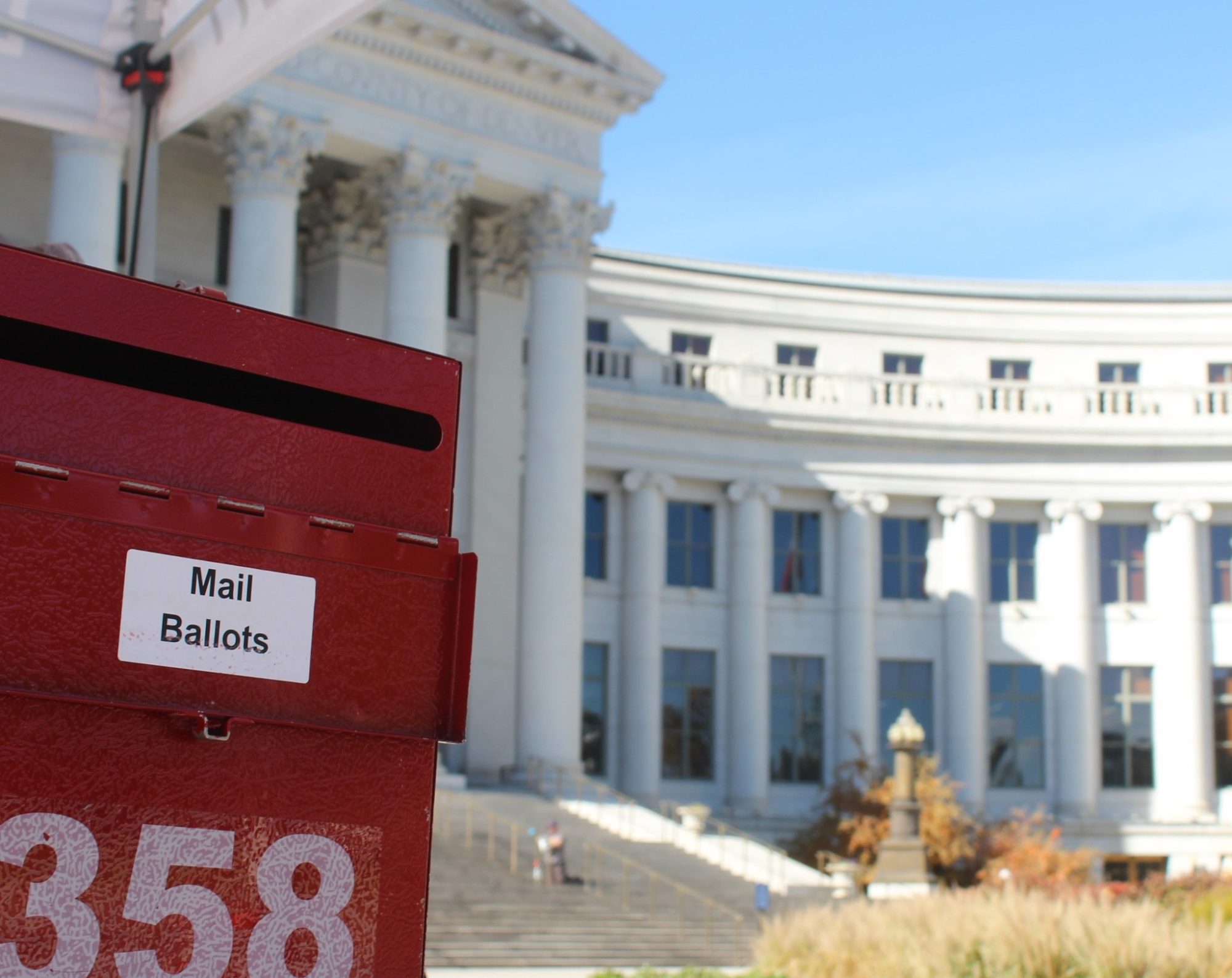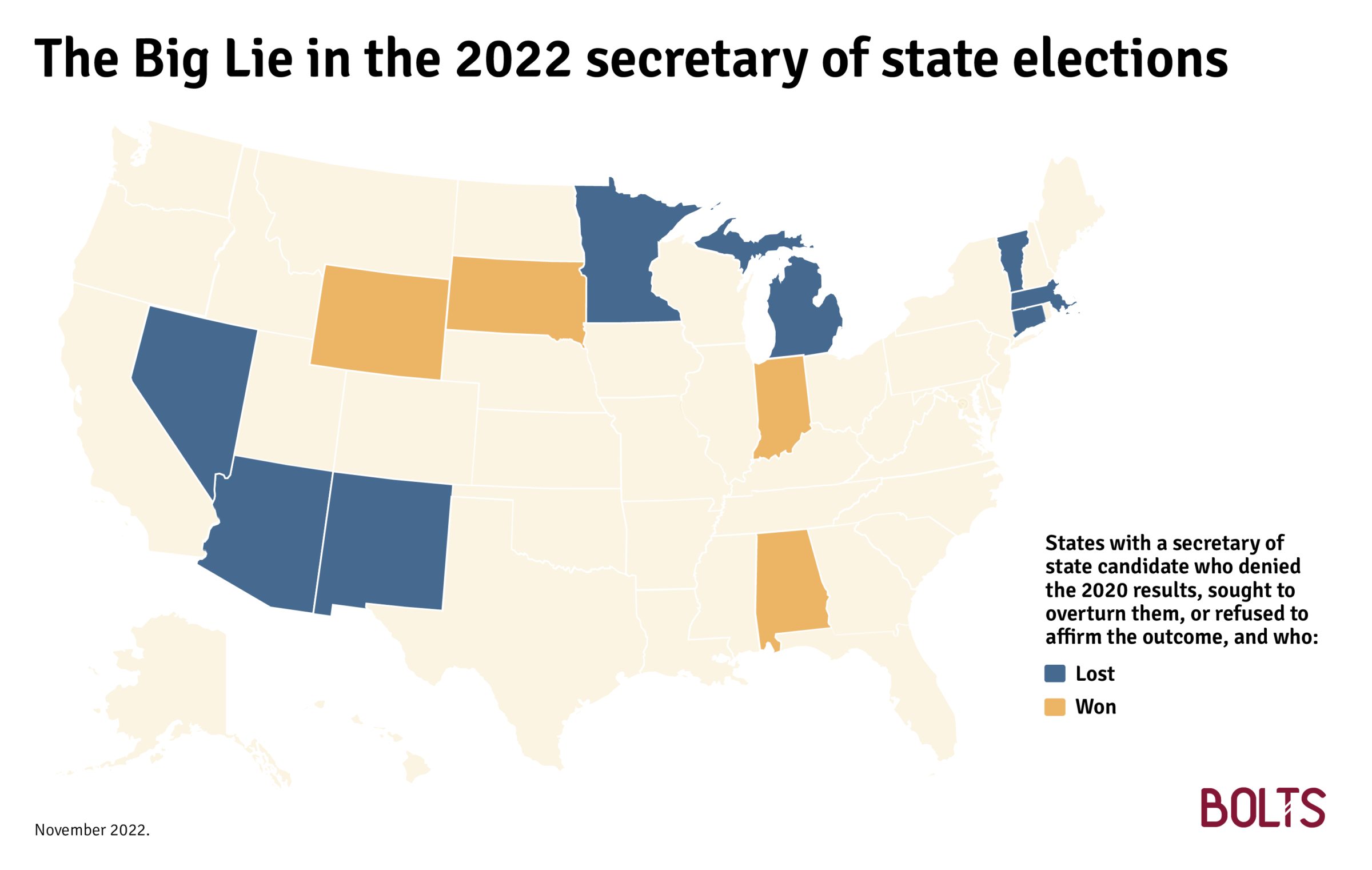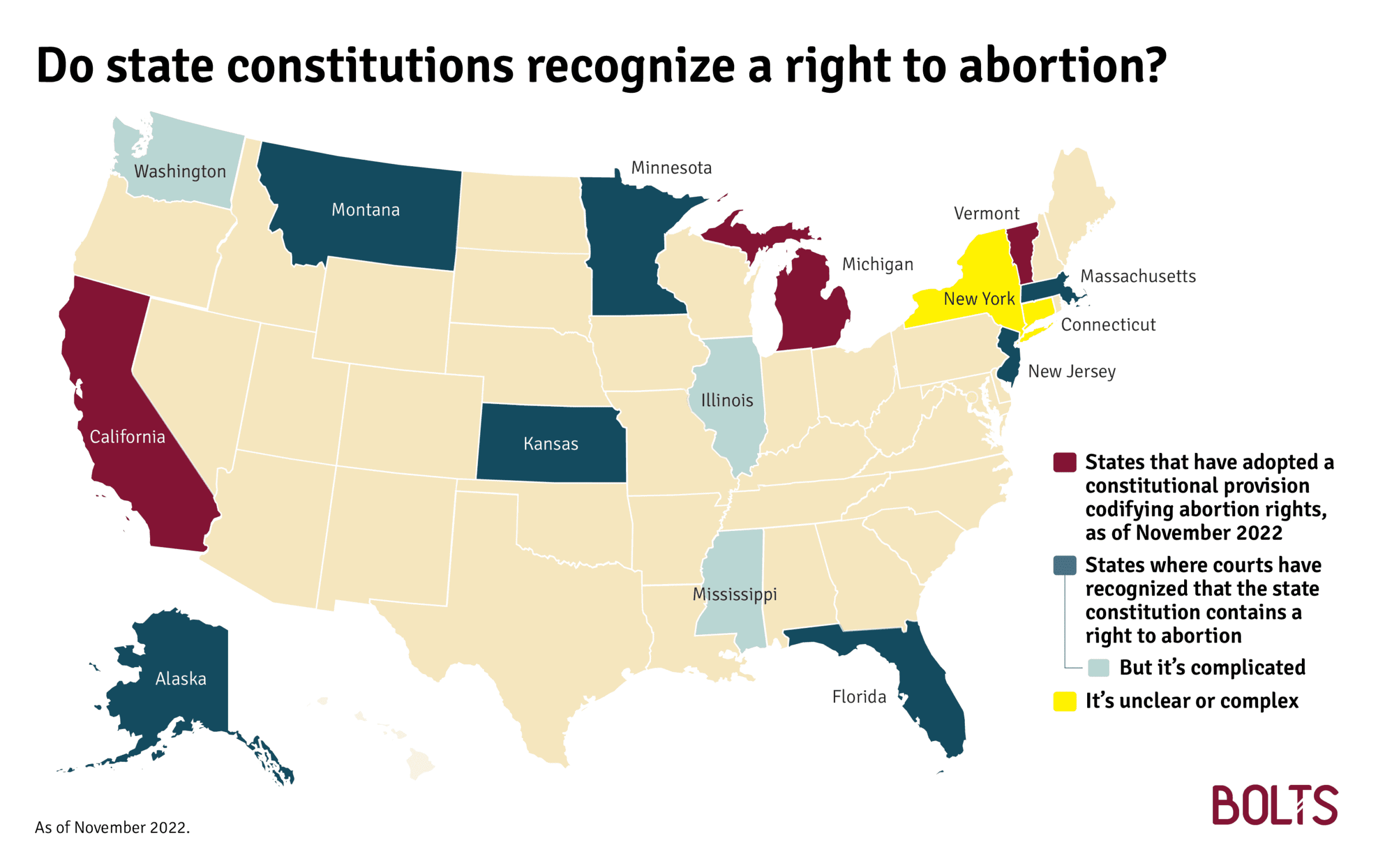Nine Midterm Stories You Should Not Miss on Criminal Justice and Voting Rights
Criminal justice reformers made inroads, election deniers crashed out, and Democrats held their own.
| November 15, 2022

This is Bolts’s weekly newsletter, sent out on Nov. 15. Sign-up to receive future newsletters.
This was not the election that politicians and pundits expected.
Defying the historical trends of midterms, Democrats held the U.S Senate and have a chance to expand their majority if they win a runoff in Georgia next month. Republicans are on the brink of capturing the U.S. House but their still-uncertain majority will be far tighter than they envisioned.
Democrats did even better in state-level fights. They defended or flipped most of the cycle’s competitive governorships, seized at least three legislative chambers, and defeated all election deniers who were running to take over election administration in battleground states. They also seized control of four state governments—Maryland, Massachusetts, Michigan, and Minnesota—which should yield major policy ramifications next year.
The result is most historic in Michigan, which will experience its first period under Democratic governance since the early 1980s, and where voters also approved enshrining abortion rights in the state constitution.
Republicans did score important wins, notably flipping control of North Carolina’s supreme court and Nevada’s governorship. But they have gained no state government as of now, and they have lost control of the state government in Arizona for the first time since 2009.
Bolts has updated its cheat sheet of more than 500 elections to watch with results that are known, so you can keep track of all these developments in one place.
But we are most focused at Bolts on the politics of criminal justice and voting rights, two areas where local officials wield tremendous powers but are often overlooked. Since Tuesday, the Bolts team has extensively reported on how the elections will affect political power on those issues.
This post lays out all our findings—on prosecution, policing, immigration, voting rights, the politics of courts, and more.
— Daniel Nichanian, editor-in-chief
In secretary of state races, election deniers (mostly) lose
Ever since his failure to cling to power in 2020, Donald Trump hoped to install allies into the offices that run and certify elections in 2022. But voters last week repudiated the candidates who were signaling that they may override the wishes of the electorate.
All election deniers who ran for secretary of state in battleground states lost on Tuesday, blocking major avenues for the former president to manipulate the next election.
Jim Marchant, the Republican nominee in Nevada, came closest, losing by only two percentage points. Mark Finchem, an Arizona lawmaker who has championed proposals to decertify his own state’s presidential results, lost by a slightly wider margin. In Michigan, Minnesota, and New Mexico, incumbent Democrats crushed election deniers by margins ranging from 9 to 14 percentage points. And in Pennsylvania, voters resoundingly rejected a far-right candidate for governor who had promised to appoint a like-minded secretary of state, with the risk of throwing the election process into chaos.
Still, Republicans who ran on the Big Lie did not end up empty handed on Tuesday. A nationwide Bolts analysis found 12 election deniers who were running for secretary of state. Four of them won in red states: Alabama, Indiana, South Dakota, and Wyoming.

Read more from Camille Squires and Daniel Nichanian in Bolts about how the Big Lie fared on Tuesday.
Criminal justice reformers make inroads
Republicans bet that they would score gains in the midterms by attacking criminal justice reformers. But that strategy repeatedly failed last week, most notably in the U.S. Senate race in Pennsylvania, where Democratic nominee John Fetterman prevailed after relentless attacks over his record of promoting clemency for people incarcerated for life.
Reformers also made inroads in local races and are poised to take over new prosecutor offices.
Mary Moriarty, a career public defender who has clashed with the local police and prosecutors, will be the next prosecutor of Hennepin County, home to Minneapolis. After a campaign that encapsulated the local conflicts over policing and prosecution since George Floyd’s murder, she easily prevailed against a former judge who had argued that reform rhetoric was threatening public safety.
Moriarty made the opposite case, impugning the effects on safety of decades of tough-on-crime policies. “I thought, people who really value public safety, and a fair and just system need to step up during this time of turmoil and really present options that aren’t the same old things we’ve had for decades, which haven’t kept us safer,” she told Bolts and Mother Jones in October.
Other candidates who emphasized a reform message also prevailed. Kimberly Graham, who represents abused and neglected children in court, won in Polk County (Des Moines), Iowa’s most populous county. Kelly Higgins, a defense attorney, won the DA race in fast-growing Hays County, Texas, after promising a “sea change;” he told Bolts that he was moved toward more progressive positions by a group of activists organizing in Central Texas. They join Memphis’s new DA, who ousted a tough-on-crime incumbent in August, in growing reform ranks. In Dallas and San Antonio, Democratic DAs who have come under GOP fire for their policies and have promised to not prosecute abortion beat tough-on-crime challengers.
In King County, home to Seattle, voters chose Leesa Manion over a candidate who wanted to bring more punitive practices to the county. Manion, who has cast herself as a cautious reformer rather than embrace progressive priorities, helped roll out reforms as chief of staff of the retiring prosecutor.
Reform candidates lost important races, though, in counties where they were challenging incumbent prosecutors. They fell short in Maricopa County, Arizona, Pinellas and Pasco counties, Florida, Plymouth County, Massachusetts, and Douglas County, Nebraska. In Maricopa, the nation’s fourth most populous county, Republican Rachel Mitchell defeated a Democratic challenger who promised to never prosecute abortion and to work to lower incarceration. In Plymouth, the defeat of a civil rights attorney adds to other losses by state progressives in September’s Democratic primaries.
One of the year’s most important DA races remains undecided, as candidates are separated by less than one percentage point with tens of thousands of ballots left to be counted in Alameda County (Oakland).
Debates over police accountability shake up local elections
Running for DA in Oklahoma County, Republican Kevin Calvey vowed to drop the charges filed by the outgoing DA against five Oklahoma City police officers who shot and killed 15-year Stavian Rodriguez outside a convenience store. “I would have shot him myself,” he said during a primary forum. Calvey lost last week to Democrat Vicki Behenna.
The local Fraternal Order of Police in Marion County, Indiana, targeted chief prosecutor Ryan Mears this year and endorsed a Republican candidate who wanted to ramp up low-level arrests and prosecutions. Mears prevailed last week.
And in Los Angeles, Kenneth Mejia captured the office of controller after an unconventional campaign that highlighted the magnitude of police spending in the city, including putting up billboards visualizing the size of the LAPD budget compared to other city services. Throughout the Los Angeles region, many candidates backed by police groups were trailing as of the latest count, including Rick Caruso in the Los Angeles mayoral race (against Karen Bass) and Suzie Price in the Long Beach mayoral race (against Rex Richardson).
In San Francisco, though, interim DA Brooke Jenkins, who replaced the reform-minded Chesa Boudin over the summer, prevailed against challengers who have criticized her handling of police accountability. Bolts reported two weeks ago that Boudin’s ouster has disrupted the prosecution of police officers who killed civilians, alarming victims’ families.
Ballot measures revamp voting rules
Ballot measures around the country resulted in expansive changes to election rules through reforms that are meant to increase turnout or make results more representative.
The biggest expansion of ballot access came with Michigan’s Proposal 2, a catchall measure to make voting easier while also protecting against efforts to curtail voting rights launched in the aftermath of the 2020 presidential election. It will establish nine days of early in-person voting, create new mandates for townships to set up ballot drop boxes, and supply state-funded postage to vote by mail. Early voting also notched a win in Connecticut, where voters authorized the legislature to set up early voting.
Oakland, California revamped campaign finance by adopting a democracy vouchers program. In future local elections, the city will provide each eligible voter with four $25 vouchers to donate to candidates of their choice.
In at least seven localities, including the state of Nevada, voters approved ranked-choice voting, which could durably shake up political dynamics. The measure in Nevada must be passed a second time by voters in 2024 to go into effect.
Measures to protect abortion triumph
Voters in California, Michigan, and Vermont on Tuesday adopted constitutional amendments that enshrine abortion rights into their state constitutions. The result in Michigan will have the most immediate effects since, unlike California and Vermont, Michigan has a statutory ban on abortion on the books. Prosecutors were already preparing for questions about whether they will prosecute abortion cases.
Pro-choice advocates also scored victories in referendums that were organized by anti-abortion forces in Kentucky and Montana.
An analysis published by Bolts in July found that a dozen state supreme courts have ruled that their states’ constitution shields abortion access, a critical protection in the face of the federal judiciary’s refusal to protect reproductive rights. But until Tuesday, no state constitution explicitly declared such a right; judges in those states relied on provisions that talked about a right to privacy or about due process. California, Michigan, and Vermont are the first three states to add provisions into their constitution that explicitly codify the right to an abortion.

Wins and losses for state referendums to legalize weed and psychedelics
Drug policy reformers saw mixed results last week. Voters in Maryland and Missouri supported proposals to legalize marijuana for recreational use, joining the 19 U.S. states that have already done so.
However, similar proposals in Arkansas, North Dakota and South Dakota all were shot down by voters.
Also, ten years to the week since Colorado and Oregon became the first two states to legalize recreational marijuana, Colorado voters are poised to approve a measure that removes criminal penalties for use, possession and home-grow of psilocybin (“magic mushrooms”) and some other psychoactive substances. Oregon went first on this front with a measure decriminalizing those substances in 2020, though several conservative counties chose to opt-out last week.
Read more from Alex Burness in Bolts about how drug policy fared on Tuesday.
Conservatives largely fail to oust sitting judges, but soar in two states
Mitch McConnell lost big last week, and not just because he failed to become the U.S. Senate Majority Leader. Back home in Kentucky, a local judge that has long drawn the right’s ire survived despite his opponent’s significant financial support from national conservatives, including McConnell’s PAC.
Conservatives also lost in a series of efforts to oust sitting supreme court justices in Arkansas, Michigan, Montana, and New Mexico.
The Arkansas and Montana races were ostensibly nonpartisan, but two justices secured additional terms by beating candidates with deep ties to the GOP; the result in Arkansas is the right’s second loss of the year since they failed to oust another justice in May. In New Mexico, two Democratic justices won—at least one against a candidate who echoed election conspiracies—enabling the party to retain a large majority on the court.
Democrats also retained their 4-3 edge on the Michigan supreme court; this was one of the biggest prizes of the night, with criminal justice, abortion, and voting cases hanging on the balance. They also maintained control of the hotly-disputed Illinois supreme court, one of the few that could have changed hands last week; they even expanded their majority by sweeping both seats on the ballot.
But GOP wins in two states will have vast consequences going forward.
North Carolina Republicans swept two seats and vaulted into a new majority on the high court. The results will have huge implications for redistricting, as the state must draw new maps before the 2024 elections, as well as for other civil rights cases. Bolts and NC Policy Watch reported two weeks ago on a pending case that will decide whether people on probation and parole in the state can vote.
Ohio Republicans swept all three supreme court seats that were on the ballot. All were technically already in GOP hands, and the party maintains its 4-3 edge. But the departure of Chief Justice Maureen O’Connor, a Republican who hit the mandatory retirement age, will significantly alter the court’s dynamics as she has repeatedly sided with Democratic justices in redistricting cases.
Elsewhere on state supreme courts, things went as expected. Republicans prevailed in red Alabama and Texas; all justices were retained in Florida and Kansas, where abortion rights may have been at play; and in seven states judicial candidates ran unopposed. Bolts previewed all of the cycle’s supreme court elections earlier this year.
In sheriff races, voters oust the “Trump of LA” and the “Arpaio of the “East”
Massachusetts reformers were jubilant following the defeat of Thomas Hodgson, a far-right sheriff whose 25-year reign in Bristol County has been marked by extreme medical neglect, mounting jail suicides, and staunchly anti-immigrant policies.
“Today is a great day!” Kellie Pearson, the former partner of Michael Ray, who committed suicide in a Bristol County jail, told Bolts on Wednesday. “People are becoming more educated about the state of our jails and they are ready for a change.” A Massachusetts watchdog dubbed Hodgson the “Arpaio of the East” in September.
On the other side of the country, Angelenos fired Sheriff Alex Villanueva, whose office faces a mountain of allegations of abuse and retaliation—enough to fill a book, Bolts reported in May. Villanueva, the “Trump of LA” and a determined foe of the county’s reform DA George Gascón, conceded on Tuesday while trailing challenger Robert Luna 60 to 40 percent. Still, many local progressives are pressing for independent oversight rather than rely on internal change given the dark history of the department.
But change was not on the horizon in other counties led by sheriffs who have courted investigations. In Columbus County, North Carolina, a sheriff who reportedly unleashed racist tirades and resigned last month to avoid judicial removal won a new term. In Klickitat County, Washington, a far-right sheriff who has threatened to arrest state officials appears to have survived by about one percentage point; but a candidate with a similar outlook in the state’s Clark County appears to have narrowly lost. In Frederick County, Maryland, a longtime sheriff who is similarly embedded in far-right networks leads by 6 percentage points as of publication, with some ballots remaining.
Immigration hardliners lose critical sheriff elections
Immigrants’ rights advocates cheered landmark wins last week in counties that have a history of closely working with Immigration and Customs Enforcement (ICE) to identify and detain immigrants.
Barnstable County, home to Cape Cod, stood out as the only county in New England to contract into ICE’s 287(g) program, which enables sheriff’s deputies to act like federal immigration agents. But voters elected a new sheriff who promises to “rip up” the county’s contract. In neighboring Bristol County, voters ousted Thomas Hodgson, a sheriff with a history of draconian anti-immigrant policies. (See above.)
In Wake County (Raleigh), North Carolina, longtime sheriff Donnie Harrison failed in his comeback effort and lost to Democrat Willie Rowe. While in office, he joined the 287(g) program and frequently demonized immigrants but abruptly changed his stance on collaborating with ICE when asked by Bolts in August. Advocates took his flip as a sign that protecting immigrants remains a potent issue. In Doña Ana County, New Mexico, a border county that is home to Las Cruces, Democratic Sheriff Kim Stewart easily prevailed over a Republican challenger who was advocating for a tighter relationship with federal agents.
Voters also approved a ballot measure in Arizona to provide in-state tuition to students regardless of their legal status, and in Massachusetts to enable undocumented immigrants to access drivers’ licenses.
Still, several of the nation’s notorious anti-immigrant sheriffs likely survived in more rural areas, including in Alamance County, North Carolina, and in Frederick County, Maryland.
Read more in Bolts on the results in sheriff’s races that matter to immigration.
And also don’t miss…
Alabama and Ohio each adopted ballot measures pertaining to bail that could expand pretrial detention. Alabama also voted to introduce new restrictions on their governor’s ability to grant reprieve for a death sentence.
Wisconsin re-elected its Democratic attorney general over a GOP challenger who threatened to ramp up prosecutions over elections.
Montana voted to require police to obtain search warrants before searching electronic data.
Dallas Republicans lost their last seat on the county’s commissioner court, in a proxy battle over whether to pursue criminal justice reforms.
Four states voted to remove the so-called slavery loophole from their constitutions, which permitted forced and unpaid labor as punishment for crimes; advocates have hoped this may help their legal fight against forced prison labor.
South Dakota expanded their Medicaid program, after a decade of GOP politicians refusing to expand the program as provided by Obamacare. In June, state voters rejected a separate measure that the GOP rushed onto the ballot that would have increased this measure needed.
In Los Angeles, voters appear to have approved ballot measures that will strengthen affordable housing.
And New York State approved a $4.2 billion bond to fund green infrastructure.
The article was updated on Nov. 15 with the outcomes of elections in Los Angeles and San Francisco.

